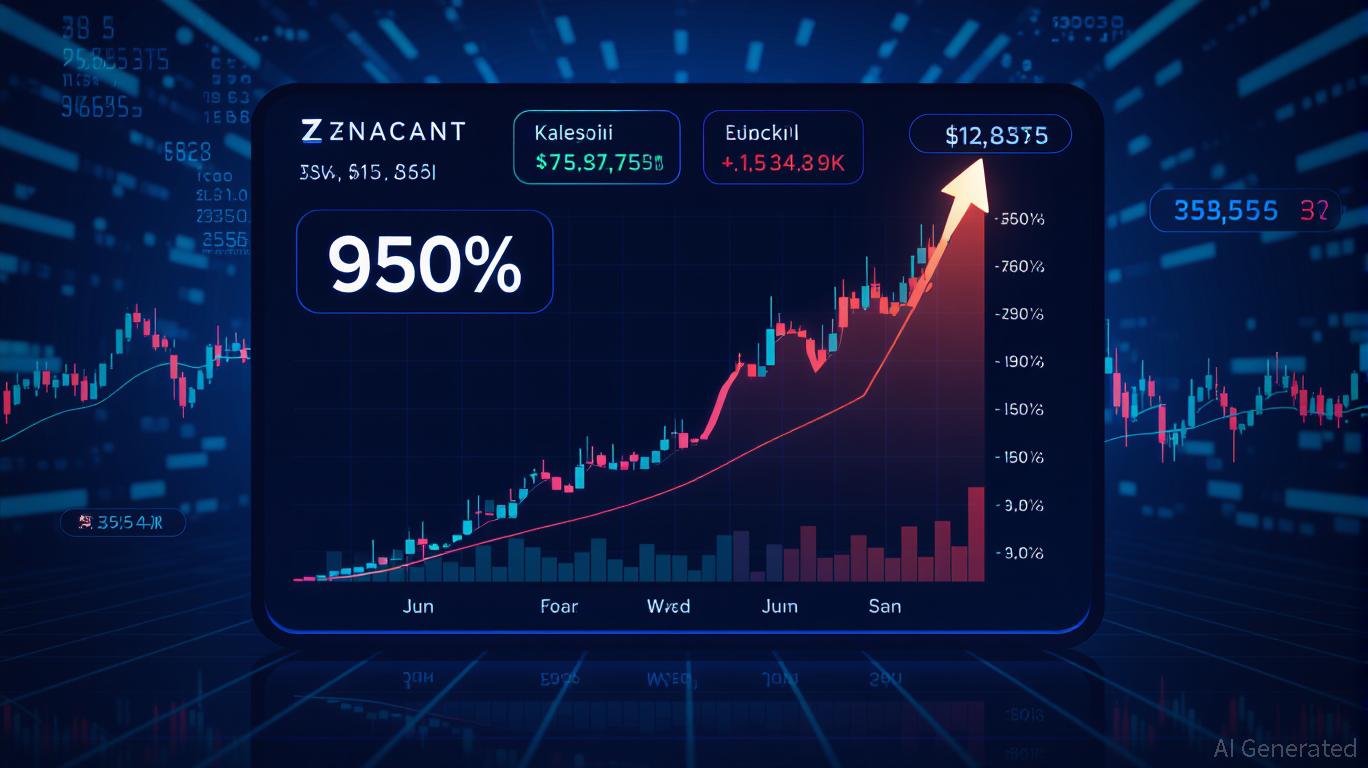BNB News Today: Trump's Clemency Sparks Crypto Market Fluctuations and Fuels Regulatory Discussions
- Trump's pardon of Binance founder CZ Zhao sparks 6% BNB surge and U.S. re-entry speculation. - Critics condemn the move as a conflict of interest, citing Binance’s ties to Trump’s crypto venture. - Binance accelerates Asia expansion via partnerships and $44.2B stablecoin reserves, reinforcing cross-border trading hub status. - BNB’s resilience amid volatility sees analysts project $1,600 targets, though resistance at $1,180 remains a key hurdle. - The pardon highlights shifting crypto regulation under Tr
Trump’s Clemency for Binance Founder Triggers Crypto Market Swings and Strategic Recovery
By [Author Name]

On October 22, President Donald Trump granted a pardon to Changpeng "CZ" Zhao, the creator of Binance, sending shockwaves through the digital asset sector. This decision has reignited conversations about regulatory flexibility and sparked renewed speculation regarding Binance’s international strategies. With legal barriers now lifted for Zhao, Binance Coin (BNB) jumped 6%, and talks intensified about the exchange’s possible return to the U.S. market, from which it has been absent since 2019.
After admitting guilt to anti-money laundering offenses in 2023 and serving a four-month sentence, Zhao now faces fewer limitations in his involvement with Binance. Trump’s pardon, part of his broader pro-cryptocurrency platform, has been interpreted as a challenge to the Biden administration’s regulatory stance. Crypto supporters claim the pardon affirms the sector’s legitimacy, according to
Despite regulatory obstacles, Binance continues to command 40% of the global spot trading market and has used the pardon to speed up its growth plans. The company has strengthened its position in Asia through collaborations such as SoftBank’s PayPay investment in Binance Japan and by securing a full license to operate in Thailand. Its $44.2 billion in ERC-20 stablecoins supports liquidity in countries like India, Brazil, and South Korea, further establishing Binance as a key player in international trading, as noted by
Market responses have varied.
The pardon has also revived discussions about regulatory safeguards. While Trump’s administration has adopted a more crypto-supportive approach—rolling back enforcement actions from the Biden era—financial authorities continue to warn of potential dangers. The SEC’s recent decision to drop its lawsuit against Binance and the Justice Department’s dismissal of charges related to Coinbase signal a changing regulatory environment, as previously covered by Time. Opponents argue that the pardon weakens anti-money laundering (AML) initiatives, especially in light of Binance’s $4.3 billion settlement for compliance lapses in 2023, according to
Within the crypto community, opinions remain split over Zhao’s possible return to a leadership position. Following the pardon, Polymarket odds for his reinstatement as CEO spiked to 82% before dropping to 36% as doubts emerged, as reported by
As Binance faces this crucial juncture, industry watchers are monitoring for regulatory developments and strategic decisions. A return to the U.S. market could add billions in trading volume, but challenges persist, including meeting AML standards and competing with domestic platforms like Coinbase. For now, BNB’s price movements and Binance’s global strategies highlight the unpredictable intersection of politics, regulation, and technological innovation in the cryptocurrency industry.
Disclaimer: The content of this article solely reflects the author's opinion and does not represent the platform in any capacity. This article is not intended to serve as a reference for making investment decisions.
You may also like
Zcash Halving 2025: Impact on Cryptocurrency Market Trends
- Zcash's 2025 halving reduced block rewards to 1.5625 ZEC, triggering a 950% price surge to $589 amid ZIP 1015 scarcity mechanisms. - Institutional adoption accelerated, with Grayscale acquiring 5% supply and Cypherpunk committing $100M, mirroring Bitcoin's post-halving trends. - Speculative trading drove $1.11B in Zcash futures open interest, causing 24% 24-hour price swings as retail investors chased scarcity-driven gains. - Hybrid consensus and optional privacy features differentiate Zcash from Bitcoin

ICP Network's Rapid Expansion and Increasing Institutional Embrace: Key Strategic Considerations for Long-Term Investors in Web3 Infrastructure
- ICP's 2025 growth stems from Fission/Chain Fusion upgrades enabling Bitcoin-Ethereum interoperability and Caffeine AI's no-code dApp platform attracting 2,000+ developers. - Institutional adoption surged with $1.14B TVL, Microsoft-Google partnerships, and first ICP ETP via Copper-DFINITY collaboration expanding institutional access. - Despite $4.71 price peak in November 2025, 10%+ volatility highlights risks, though 11,500 TPS capacity and $357M daily trading volume signal infrastructure strength. - Lon

New Prospects in STEM Learning and Career Advancement: Sustained Institutional Commitment to Academic Initiatives Fueling Tomorrow’s Innovation
- Global STEM education is accelerating as AI and engineering drive economic transformation, with 2025 government initiatives expanding AI-focused programs and workforce development. - U.S. universities report 114.4% growth in AI bachelor's enrollments, supported by corporate partnerships and $25M+ in tech industry investments for AI labs and teacher training. - EdTech's AI-powered platforms, valued at $5.3B in 2025, are projected to reach $98.1B by 2034, with startups like MagicSchool AI securing $45M in

ICP Caffeine AI: Leading the Way in AI-Powered Investment Prospects within the Web3 Landscape
- ICP Caffeine AI, developed by DFINITY Foundation, merges AI and blockchain to enable no-code app development via natural language prompts. - Its "chain-of-chains" architecture and Chain Fusion technology enhance scalability and cross-chain interoperability for AI-native applications. - With $237B TVL and partnerships with Microsoft/Google Cloud, ICP faces competition from TAO and RNDR but aims to rival AWS with on-chain AI solutions. - Institutional adoption in finance and energy, plus regulatory alignme
